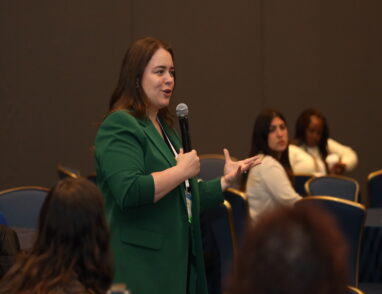Health Equity Accreditation Plus:
9 Pioneers Show It Works
October 5, 2022 · Andy Reynolds
Seven health plans and two health systems finished a pilot project in September to test new NCQA standards for assessing health equity.
By successfully completing the project, they are first to earn both:
- Health Equity Accreditation: Our core expectations for health equity, and
- Health Equity Accreditation Plus: Our most advanced equity designation.
This achievement is significant for a few reasons:
- As a milestone in NCQA’s drive to integrate health equity into all our products and programs.
- As the dawn of a new era in which many organizations—including health systems—can show their commitment to measuring and improving health equity.
- As a feasibility test proving that high standards for health equity work as a cornerstone of quality.
Ensuring Health Equity in Everything
We began assessing and incenting health equity in 2010 with the launch of Multicultural Healthcare Distinction.
George Floyd’s death and COVID’s uneven impact on racial and ethnic groups convinced us in 2020 to revisit and speed the health equity work we had started a decade before.
We committed to weave health equity into all our future work, based on two principles:
- High quality care is equitable care.
- There is no quality without equity.
Conferring the NCQA seal on nine organizations that earned advanced Health Equity Accreditation is an important step in making equity and quality synonymous. NCQA Director of Health Equity Initiatives, Bryan Buckley, is leading other projects to help realize that vision.
We’ve also made health equity a pillar of the HEDIS measurement set.
- Scroll to the Webinar Archives on our Future of HEDIS page. Watch episodes 8, 9 or 10 for background on how HEDIS informs equitable health care.
- Attend our webinar on Thursday, October 6, to see how we’re using HEDIS to investigate, illuminate and elevate health equity. If you miss the live discussion, you can access the webinar in the archives about a week later.
Opening the Door to Many Organizations
The nine organizations that earned both Health Equity Accreditation and Health Equity Accreditation Plus are:
- Aetna Better Health of Michigan, Inc.
- Geisinger Health Plan.
- Health Net of California, Inc.
- Hennepin Healthcare.
- Molina Healthcare of California Partner Plan Inc.
- Novant Health’s Coastal Communities, Greater Charlotte Market, Greater Winston-Salem Market.
- Simply Healthcare Plans, Inc., an Elevance Health Company.
- UnitedHealthcare Community Plan, Inc. (MI).
- UPMC For You, Inc.
The pilot group’s composition is significant because it includes two health systems: Hennepin Healthcare and Novant. NCQA’s roots are in assessing health plans (Health Plan Accreditation and our Health Plan Report Cards). Mergers and the rise of “payviders” blur the lines between health plans and provider groups. We are evolving with those changes!
Now that the programs have officially launched, more than 140 organizations have registered for one or both evaluations.
State governments endorse our approach. California and Delaware require Medicaid health plans to earn an NCQA Health Equity Seal. California and Washington, DC, require it for their Exchange plans. And Massachusetts mandates it for ACOs.
Proving Standards’ Feasibility
We believe in our health equity standards because of how we developed them: in close collaboration with our pilot colleagues.
We augmented our normal public comment with frank, frequent discussions with our collaborators.
This iterative approach had several advantages:
- Bidirectional sharing: We presented our ideas and challenged participants. They challenged us and helped sharpen our thinking.
- Mentorship: Pilot organizations connected outside the structured meetings and helped each other consider how to meet NCQA’s expectations.
- Real-time engagement: Working together with pilot participants on the same problem, at the same time, taught us more than we usually learn from reviewing written feedback. Our conversations informed program development.
Collaborators helped us set high—yet achievable—standards. Thoughtful feedback helped us structure both programs to ensure that numerous organizations can commit to measuring and improving health equity, regardless of where they start.
- Our core Health Equity Accreditation standards focus on addressing care inequities.
- Our “Plus” standards build on that foundation by adding expectations for:
- Partnering with community-based organizations.
- Offering resources that support clinical and social needs.
- Collecting data on community social risk factors and patients’ social needs.
- Being transparent with members and patients how their data are used, shared and protected.
Our pilot colleagues gave a lot of time to the collaboration:
- 1:1 meetings: 1 hour per week, per organization, for 8 months.
- Group meetings: 1-hour collective discussions for all organizations, 1–2 times per month.
- Mock surveys: 8 hours of reading each line of every standard for all organizations, to ensure that evidence met expectations.
We thank our pilot collaborators for their patience and commitment!
Check back for news about pilot projects related to health equity and future topics.
The composition of the pilot group is significant because it includes 2 health systems: Hennepin Healthcare and Novant. NCQA’s roots are in assessing health plans, hence Health Plan Accreditation and Health Plan Report Cards. Mergers and the rise of “payviders” blur the lines between health plans and provider groups. We are evolving with those changes—hence our work with systems such as Hennepin and Novant.
Now that the pilot program for both health equity programs has finished, more than 140 organizations have registered for one or both evaluations.
State governments endorse our approach. California and Delaware require Medicaid health plans to earn an NQQA health equity seal. California and the District of Columbia require it for their Exchange plans. And Massachusetts mandates it for ACOs.
Proving Standards’ Feasibility
We believe in our health equity standards because of how we developed them: In close collaboration with our pilot colleagues.
We augmented our normal public comment by having frank, frequent discussions with our collaborators.
This iterative approach had several advantages:
- Bi-directional sharing: We presented our ideas and challenged participants. They pushed back and helped us sharpen our thinking. The feedback went both ways.
- Mentorship: Pilot organizations connected outside of our structured meetings and helped each other consider how they could meet NCQA’s expectations.
- Real-time engagement: Sitting side-by-side with pilot participants to look at the same problem at the same time taught us more than we typically learn in asynchronous review of written feedback. Conversation enhanced reading and writing.
Collaborators helped us set standards that are high yet achievable. Their thoughtful feedback helped us structure Health Equity Accreditation and Health Equity Accreditation Plus to ensure many organizations can commit to measuring and improving health equity, regardless of where they start.
- Our core Health Equity Accreditation standards focus on addressing care inequities.
- Our “Plus” offering builds on that foundational framework by adding expectations for:
- Partnering with community-based organizations.
- Offering resources that support clinical and social needs.
- Collecting data on community social risk factors and patients’ social needs.
- Making clear to members and patients how their data are used, shared and protected.
Our pilot colleagues gave a lot of time to the collaboration:
- One-on-one meetings: 1 hour per week per organization for 8 months.
- Group meetings: Collective discussions for all pilot orgs for at least an hour, 1-2 times per month.
- Mock surveys: 8 hours of going through each line of the standards and discussing the organization’s evidence that it meets each expectation.
We thank our pilot collaborators for their patience and commitment.
Check back for news about pilot projects related to health equity or other topics.







